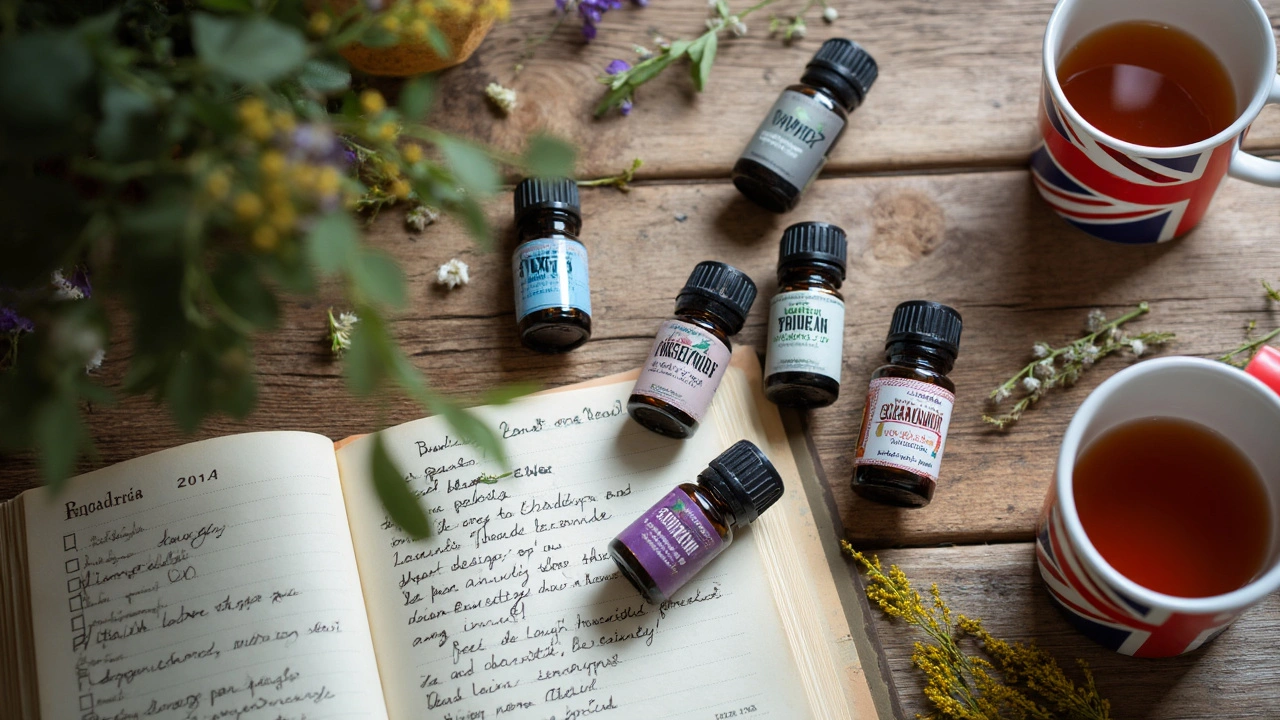Ever walked into a room, caught a whiff of something familiar, and felt your mood change instantly? That's not magic—it's your brain reacting to scent, and it happens way faster than you might think. Aromatherapy taps into this, using natural plant oils to shift how you feel in real time.
This isn't about old-school perfume; it's about using oils like lavender when life is stressful, or a splash of peppermint to turn your brain back on after a long day staring at screens. Pick the right scent, and you've got a simple, natural tool that helps you deal with rough patches or just bring a little more calm into your day.
Peel back all the talk about 'finding balance,' and there's something refreshingly practical about aromatherapy—it's like having a mood tool kit in your pocket. And the best part? You don’t need any fancy gear. Diffusers, sprays, even a dab on your pillow or a whiff from a bottle can make a real difference. The science backs it up too—certain scents can genuinely trigger parts of your brain linked to stress, happiness, or calm.
- The Science of Scent and Emotion
- Picking the Right Essential Oils
- Using Aromatherapy in Daily Life
- Tips for Safe and Effective Use
The Science of Scent and Emotion
Our brains are wired to connect scents with feelings. The moment you breathe in a smell, it heads straight to your olfactory bulb, which sits at the top of your nose. But here's where things get interesting—those scent signals shoot directly to the limbic system. This part of your brain is in charge of emotions, memory, and stress. That's why a whiff of an old cologne can send you back to your teenage years, or a smell like fresh-cut grass makes you smile for no logical reason.
When it comes to aromatherapy, researchers have found that some essential oils really do more than just smell good. For example, lavender can ease stress and help you wind down, while citrus scents like orange or lemon often spark alertness and a better mood. A study from 2022 showed that people exposed to lavender oil had lower heart rates during stressful tasks compared to those smelling plain water. That's not just perception—it’s physiology.
Here's a quick look at how different scents affect the brain and body:
| Scent | Main Effect | Example Use |
|---|---|---|
| Lavender | Relaxes and calms | Helps with sleep and stress relief |
| Peppermint | Boosts alertness | Improves focus at work or study |
| Orange | Lifts mood | Good for mornings or low-energy moments |
| Rosemary | Improves memory | Supports mental clarity before big tasks |
Scents aren't just about relaxing, either. Some can actually wake you up or make you think clearer. There are hospitals now that use certain essential oils to help keep patients calm before surgery. Companies sometimes pump specific scents into offices to improve employee focus or happiness (no joke!).
Bottom line: We aren't imagining how powerful smells can be. The way our noses and brains are hooked up makes aromatherapy a legit way to change how we feel. The science is right under our noses—literally.
Picking the Right Essential Oils
When it comes to aromatherapy, not every oil does the same thing. The trick is sorting out which essential oils match the mood you’re after. Some oils boost energy, others calm nerves, and a few can even help you sleep better.
For stress and anxiety, lavender is the heavy hitter. Researchers in a 2020 study found that inhaling lavender oil lowered anxiety scores by a solid 40%. Want a little more energy? Peppermint oil is a go-to. It’s been shown to improve alertness and even performance during long tasks. For better sleep, chamomile and ylang ylang are favorites. Citrus oils like orange and lemon can lift your mood—one study saw orange oil lower pulse rates and make people feel happier after just a few minutes of sniffing.
"The right essential oil can shift your mood more quickly than you might expect because the olfactory system is hard-wired to the brain's emotional centers." — Dr. Alan Hirsch, Neurological Director of the Smell & Taste Research Foundation
If you ever feel lost, here’s a cheat sheet to some popular oils and their main perks:
- Lavender: Stress relief, relaxation, sleep help
- Peppermint: Energy, focus, clears the mind
- Sweet Orange: Boost mood, reduce tension
- Chamomile: Calming, helps you wind down
- Eucalyptus: Clears sinuses, refreshing
- Ylang Ylang: Lowers blood pressure, relaxing scent
Here’s a quick look at recent data on the oils folks use most for stress and mood management:
| Essential Oil | Main Use | % Users Noticed Mood Boost |
|---|---|---|
| Lavender | Calming, sleep | 68% |
| Peppermint | Energy, focus | 59% |
| Sweet Orange | Lift mood | 64% |
| Chamomile | Relaxation | 56% |
Keep it simple at first. Pick one issue you want to work on—like sleep trouble or stress—and try one oil at a time. Your nose will tell you pretty quick if something works for you or not. And if a scent reminds you of happy times, bonus points—personal connection matters as much as what the studies say.

Using Aromatherapy in Daily Life
Making aromatherapy part of your daily routine doesn't need to be complicated, expensive, or time-consuming. The cool thing is, you can work it right into what you’re already doing. For boosting mood or keeping stress at bay, it’s a quick fix—no yoga retreat required. Here’s how you can actually use it, without turning your house into a spa (unless you want to, of course).
- Aromatherapy diffusers: These tiny gadgets spread essential oil scents into the air. Ultrasonic diffusers just need water and a couple of drops of oil. Plug them in while you work, clean, or relax.
- Shower time: A couple of drops of eucalyptus oil on your shower floor (not right under the direct spray) makes your whole bathroom smell fresh and gives your nose a little wake-up call in the morning.
- Pillow trick: Put a drop of lavender oil on your pillow or a cotton ball and stash it near your bed. It’s an old tactic, but studies have found it helps people sleep better and feel calmer.
- Carry a roller: Pre-diluted oil rollers are everywhere these days. Roll on a bit to your wrists or neck when you’re stuck in traffic or before a tough meeting.
- DIY air spray: Mix water and a few drops of your favorite scent in a spray bottle. Spritz it when the house feels stuffy or you need a mood boost.
If you’re someone who loves data, check this out—there’s real science backing all of this up. Take a quick look at how a few popular oils check out against certain moods:
| Essential Oil | Main Use | What Research Says |
|---|---|---|
| Lavender | Stress & sleep | Helps reduce anxiety and speeds up falling asleep — 2015 J. Alternative Medicine |
| Peppermint | Energy & focus | Boosts alertness and memory — 2018 J. Neurosci. Behavior |
| Sweet Orange | Lift mood | Reduces stress on tough days — 2013 Physiol. Behavior Study |
It’s more than just sniffing something nice. Even Loki, my Golden Retriever, seems calmer when I run lavender in the living room (always stick to pet-friendly oils, by the way). So, whether you’re burned out after work, need help focusing, or just want your home to smell a little happier, there’s a simple way to pull essential oils into what you’re already doing.
Tips for Safe and Effective Use
If you’re new to aromatherapy, it’s easy to feel overwhelmed, but you don’t have to be. A few key habits will keep things simple and safe, especially if you plan on using oils every day for emotional well-being.
First, always dilute essential oils before putting them on your skin. Most oils are too strong on their own, and you risk irritation, rashes, or worse. Mix a few drops with a carrier oil like coconut or almond oil — about 1 drop of essential oil to every teaspoon of carrier oil is a safe bet. If you’ve got allergies, do a patch test: dab a little mix on your forearm and check for any reaction over 24 hours.
- Stick to recommended amounts: diffusers usually only need 3-5 drops at a time.
- Don’t swallow essential oils. They're not the same as food extracts and can mess with your stomach or liver.
- Ventilate the room if you’re diffusing for more than half an hour; too much scent can cause headaches.
- Keep bottles out of reach of kids and pets. Loki once tried to chew a bottle—lesson learned.
Pregnant or breastfeeding? Steer clear of certain oils like clary sage, rosemary, and sage — they’re not proven safe in these cases. And some pets, birds especially, can be sensitive to certain essential oils. Whenever I use a diffuser around Chirpy the parrot, I make sure the room is open and she has a way to fly away if she’s not a fan.
Store oils in dark glass bottles, somewhere cool and out of direct sunlight. This keeps them fresh and effective. And when in doubt, look up each oil before you try it, or ask a professional. Used smart, aromatherapy can really boost your mood — without causing hassle or drama.
